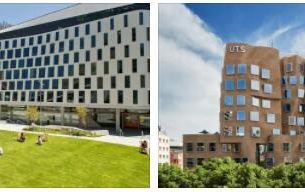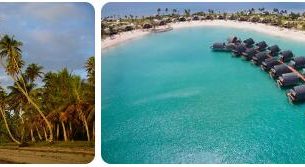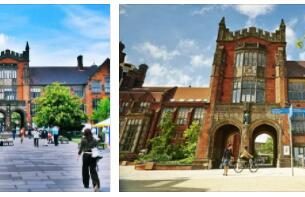From NRW to NSW (New South Wales)
If there is one thing I can warmly recommend, it is a semester abroad at UTS. Even if I don’t have the comparison, I can definitely say that you will spend a very good time there – for me personally the best and most intense of my life.
Preparation
I was very late with the preparations for my semester abroad. Nevertheless, I can recommend everyone to apply as early as possible, as courses or preferred places in the student dormitories can be filled quickly. I had already been accepted by another university until I decided at short notice to apply for the UTS at the end of October. The big advantage was that a good grade in the English advanced course was enough, so that I was saved the time and expense of language tests such as TOEFL or IELTS. Visit andyeducation.com to get information about California State University Long Beach study abroad program.
After submitting the application, the provisional acceptance came after a few days. MicroEDU really supported me with the whole application process (here a huge thank you to Sabine!), Which made the whole thing a lot easier for me as I am always very busy. And all of my questions, no matter how nonsensical and annoying, were answered. Even with the visa everything went quickly, but I had applied for the work and travel visa (WTV), which is cheaper and gave me the opportunity to stay a little longer. In addition, I didn’t need the mandatory student visa to pay health insurance, but only had my German international health insurance (Envivas). You should also find out about accident and liability insurance.
Regarding the student visa, it should also be said that if it is 10 months or less, it is only valid for one month after the end of your studies, but can be extended with a tourist visa. However, I would rather avoid applying for the WTV, as you can only apply for it once in a lifetime. Even if you don’t plan at all to fly to Australia again after your studies to work there, you never know how the time will develop during your stay. Under certain circumstances it can happen that the previously made plan for the future changes completely. At least that’s what happened to some of my friends who decided to become their Masters to graduate there or even to spend their future there in the long term and are currently looking for career opportunities.
About the flight: I had this booked through StaTravel, which went off without a hitch. With regard to the credit card, I had set up an account with the Comdirect, as you can use this to withdraw money free of charge. I only used the card itself in Sydney to pay in emergencies, as there was a fee of almost 2% when paying. If you choose to have an account on site, you can create one at the Commonwealth Bank as a student at no additional charge.
If you are already living independently in Germany and do not want to bear the cost of the rent during that time, it is important that you look out for a suitable subtenant. And of course don’t forget the vaccinations! Then you can start your new and unique adventure!
Financing
I financed the semester abroad by saving up on my previous vocational training and my subsequent mini-job during my studies. In addition, I received a scholarship from the Hanns Seidel Foundation, which I had previously received from. But there are also various other options for a scholarship such as PROMOS or the MicroEDU scholarship. Otherwise of course Auslandsbafög, which you should apply for in good time. Personally, with 3 courses, I only had lectures on 2 days, so there would have been the opportunity to work on the side, as many do. Due to the higher cost of living the hourly wages are adjusted accordingly, which means that the costs are affordable in any case.
Note: You can deduct the expenses for the semester abroad such as tuition fees, visa, flight, insurance and much more from the tax, even if you have no income in that year. You can carry forward the high loss in the coming years and later deduct it from your income, so that you can save a not inconsiderable part of taxes (sometimes several thousand euros).
Accommodation
What made the stay abroad so good, above all, was the housing- the UTS dormitory. This comprises four buildings. My original plan was to look for a shared apartment on site, but since I was not familiar with the rental regulations in Australia and wanted to save myself problems and the resulting stress, I decided on accommodation at the university, which the very best decision was! You don’t need to organize anything – furniture is available, internet is provided and printers and computers are also on site. After my application to Housing, I got a place in the smallest of the four student dormitories “Geegal”, which was also my first choice because of the quiet location and the special feature that each shared apartment has its own house. However, you walk 15-20 minutes to the campus. has a much more family-like relationship with the other residents than in the larger dormitories, which tend to evoke a hotel feeling. The weekly rent for this was A $ 240.
I shared the accommodation with five other students of different nationalities. However, you can also choose between smaller or larger shared apartments, single apartments or rooms that you share with someone. The building with most of the accommodation is “Yura”. Ideal for party people, as the breathtaking roof with a view of Sydney is a meeting place for nightly get-togethers. The smaller variant is “Gumal”, which also has a beautiful roof terrace and is very popular. Housing continuously offers free activities- from excursions, classic barbecues and sporting events to support with studying. These events enabled me to get in touch with the other students very quickly. You can also borrow bicycles for free. In addition, there is a so-called “freestore” where students hand in their items that are no longer needed so that other students can take them.
University
Originally I decided against Sydney because of the high cost of living, but the tuition fees for “study abroad” students were lower compared to other universities and with good grades there is an automatic $ 1,000 discount. The tuition fees in Australia in general are high, but at the same time as a student you benefit from the modern facilities, the very good offers and better or more personal support. The campus was or will be completely renewed. The buildings are very futuristic and partly designed by star architects what makes studying a special experience. There are numerous rooms available for learning. The professors often provide forums in which the students can ask their questions, but the professors themselves are also very easy to reach. In the compulsory tutorials, the theory learned is put into practice. Through partial performance during the semester, you can already collect a few points and thus, depending on the subject, pass the lecture without the exam. Several tutorials are usually offered for one subject, so that the group of around 40 students is manageable. In addition, the location offers more perspectives with regard to internships, employment relationships and cultural events. The university also has very good ones to show rankings and as of 2016/2017 belongs to the top 200 worldwide.
For many subjects, the purchase of books is required, which are exorbitantly expensive in Australia (on average between 100 and 300 dollars). I hadn’t bought any books other than a law book, though weekly reading of chapters was given as homework. It paid off because I got along wonderfully with the scripts for the exams, but this may also have been due to the fact that I mostly only had to calculate calculations. So at this point I would like to point out that it can be subject-specific. Another advantage is that you can collect a lot of points during the semester, so that you may no longer have to pass the exam if you have received more than 50 points. However, the many intermediate exams also mean that it can often become stressful, mainly because that the semester system has been changed to trimesters and the same work has to be done in less time.
At the beginning of the semester, a two-week (in the spring semester there was only one) orientation and preparation week was organized in which various activities, such as campus or library tours, were offered and materials for the following lectures were to be prepared. During the semester I did not have a personal contact, but if I had any questions I could turn to the people at the “Study abroad and exchange office”, whose office hours were limited. For questions about learning support“HELPS” was available, which in addition to numerous workshops also offered help with the homework to be submitted. Sometimes for subjects that are classified as difficult or in which there is a high failure rate, the support “U: Pass” was offered in addition to the actual lecture and tutorial. This is a voluntary event in which students who have already successfully passed the subject help other students by working on and discussing assignments.
With regard to careers, the “Careers Service” also offers support, such as notifications about trade fairs, support with applications or preparation for an upcoming job interview. There is also the opportunity to join one or more of the seemingly thousands of clubs – be it groups such as student councils and sports (e. g. surfing, swimming or even the Quidditch known from the Harry Potter books), but also societies in which everything is about topics such as Photography, cooking, animal welfare, animes or computer games.
I took the Accounting Standards and Regulations, Cost Management Systems and International Accounting courses. I came to the last-mentioned event one day before the start of the lecture because a place spontaneously became available. The change went smoothly. If you are interested in accounting, I have written a little more about the individual subjects below. You can find a more detailed description on the UTS website.
Accounting Standards and Regulations: Topics covered here included recording sales, fixed assets, liabilities, financial instruments, or income tax under Australian law. During the semester, a three-hour mid-term exam (20%) had to be taken, two seminar papers (20%) with a maximum of 1,200 words each and a final exam (60%) had to be written.
Cost Management Systems: For example, the contents of product costing, process and planned cost accounting were discussed. Three tests of forty minutes each (15%) had to be passed and a group work (25%) had to be submitted, which contained a report of a maximum of 3,000 words. My group consisted of three members in total. In contrast to the other two subjects, the final exam (60%) had to be passed in addition to the fifty percent of the overall grade.
International Accounting: I expected this lecture to convey something about international accounting standards, but more general topics were dealt with, such as the harmonization of standards, sustainability or auditing. Two intermediate exams (40%) and a final exam (40%) had to be taken, and group work (20%) had to be presented. I presented this with four other students.
Everyday life
The student residences are very centrally located so that you can walk to everything. Nearby is Viktoria Park with an outdoor swimming pool or Darling Harbor. The famous opera house is only four kilometers from the campus. Also within easy reach is a large shopping center, where you can find supermarkets (e. g. Aldi) and other clothing stores, such as a newly opened H&M, or everyday items. The three dominant supermarkets include Woolworths, Coles and Aldi, which, like in Germany, is the cheapest alternative. I had also ordered a SIM card (AldiMobile) from Aldi over the Internet, as I only wanted to pay when I had used the service. So you could always top up the credit conveniently when the old one was used up.
The central location also saves you travel costs to both the campus and the city center. If you use public transport, you have to buy the Opal card (a small tip: you can also overdraw the card on which there is credit and then simply buy a new one, especially when traveling in connection with flights it makes sense not to have too much credit on the card before departure, as the train ride to the airport, which is just under 10 minutes from the main train station, costs around $ 16 (the airport charges an extra fee). A normal inner-city trip costs $ 2. 36 and on Sundays for the whole day only $ 2. 50 – no matter how many trips you make and you can even get out of Sydney such as B. to the Blue Mountains, which are about 2 hours away.
Food costs are not even as expensive as assumed. At first you are frightened by the prices, but when you convert them, they are often comparable to the German prices. Visits to restaurants are also portable. The Chinatown district is adjacent to the campus. There you will find, among other things, Paddy’s Market, where there are sometimes very cheap fruit and vegetable offers. For everyday items (be it kitchen utensils, duvets or clothing and cosmetics) Kmart is highly recommended, which offer everything at a really very attractive price. Alcohol is much more expensive there. One usually drinks beer or goon (wine in a bag), which is cheap. Club entry is also expensive on weekends (between $ 30 and $ 50 on average). However, there are always alternatives to get in for free through promotions. And you go out to party a lot during the week.
If you study in Australia, you can combine that with traveling, as the country has a lot to offer and flying is not expensive. There are also many offers for backpackers. Sydney and the surrounding area also have a lot of excursion destinations to offer, so you can’t get bored. For half a year you can with an average cost of between 15,000 to 20,000 euros expected, but this also depends on whether you travel a lot, run out or an expensive accommodation has.
Conclusion
My semester abroad at UTS was very successful, both academically and personally, and I made significant progress overall. Both at the university and in the student dormitory, I was largely involved in an English-speaking environment and, after a short period of getting used to it, was able to follow the lectures well. My English skills have definitely improved, but there are still uncertainties in grammar, as most of the time you are not corrected when speaking. However, understanding and fluency have improved.
In contrast to German universities, the UTS has many examinations spread over the semester. I was therefore very quickly faced with the challenge of producing academic texts in English. At the same time, however, life in Australia also shaped me on a personal and socio-cultural level. Due to the numerous nationalities in the dormitory, I had many opportunities for interesting discussions, which were greatly enriched by the different perspectives. Living together also offered the framework to learn more about other cultures, historical careers and religions. It was extremely pleasant to study in Sydney.
My almost seven-month semester abroad was a wonderful and unique experience that enabled me to develop on various levels. My ideas and expectations were exceeded by far. It is recommended in any case, as it enriches the personality extremely. I am extremely happy to have dared to take this step and would do it again at any time. Despite the high costs, the stay definitely pays off, as the experience is an enormous enrichment for your own life. I have had consistently positive experiences. Leaving friends and family behind isn’t always easy, but it doesn’t last forever, even if it may seem like that at first. The time abroad flies by and in the end you wish that you could stay longer.
I can only warmly advise everyone to take this experience with them – be it at UTS or any other university. Even if you have to take out a student loan for it, the experiences that you will take with you will enrich the rest of your life. It also improves your career opportunities, as a stay abroad – especially in business – greatly enhances your résumé, especially if you have spent it in one of the world’s major cities. The challenge of starting over in a completely strange and unfamiliar environment will make you stronger. You not only broaden your vocabulary, but also your personal horizons. It’s just priceless!



